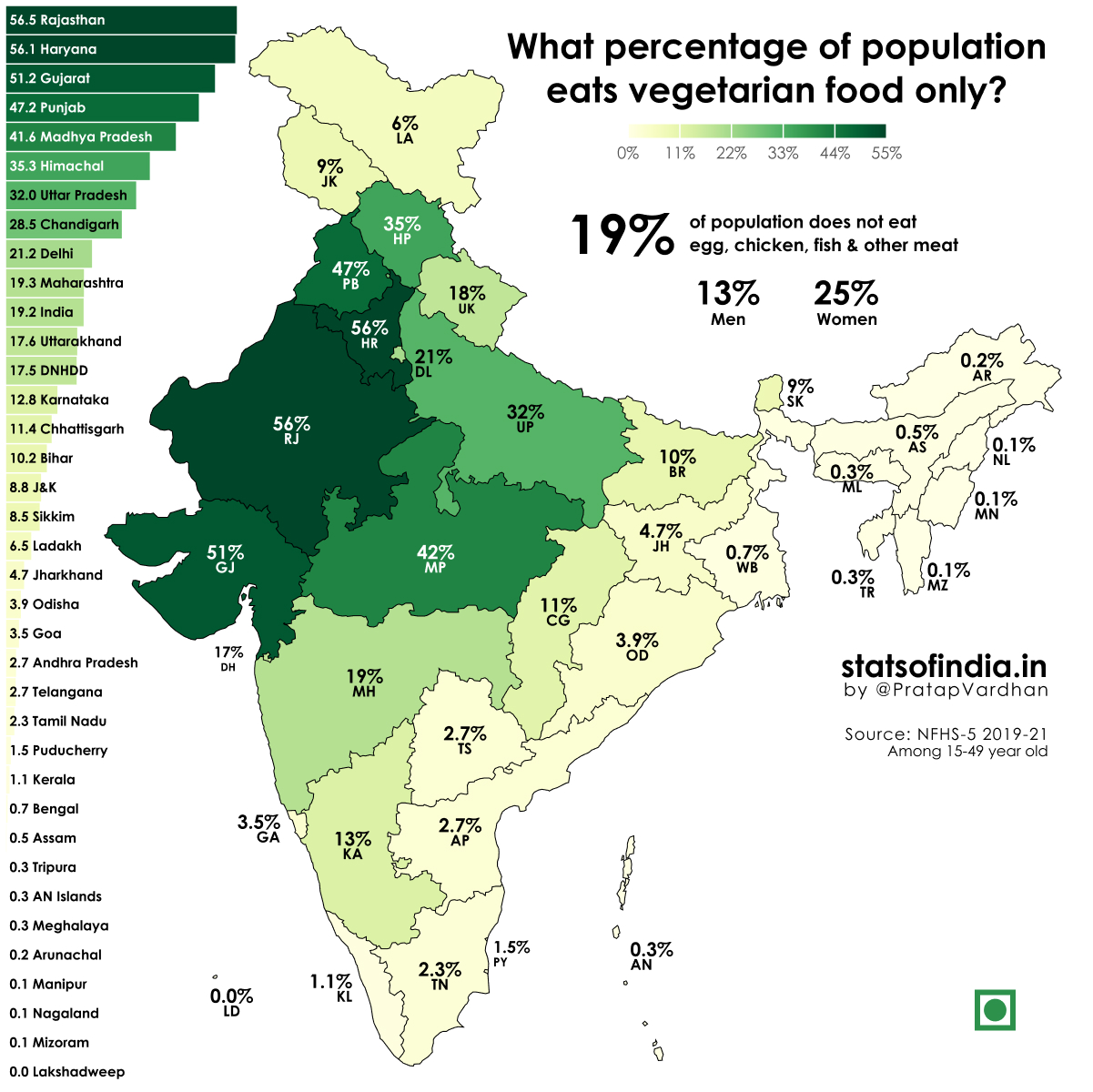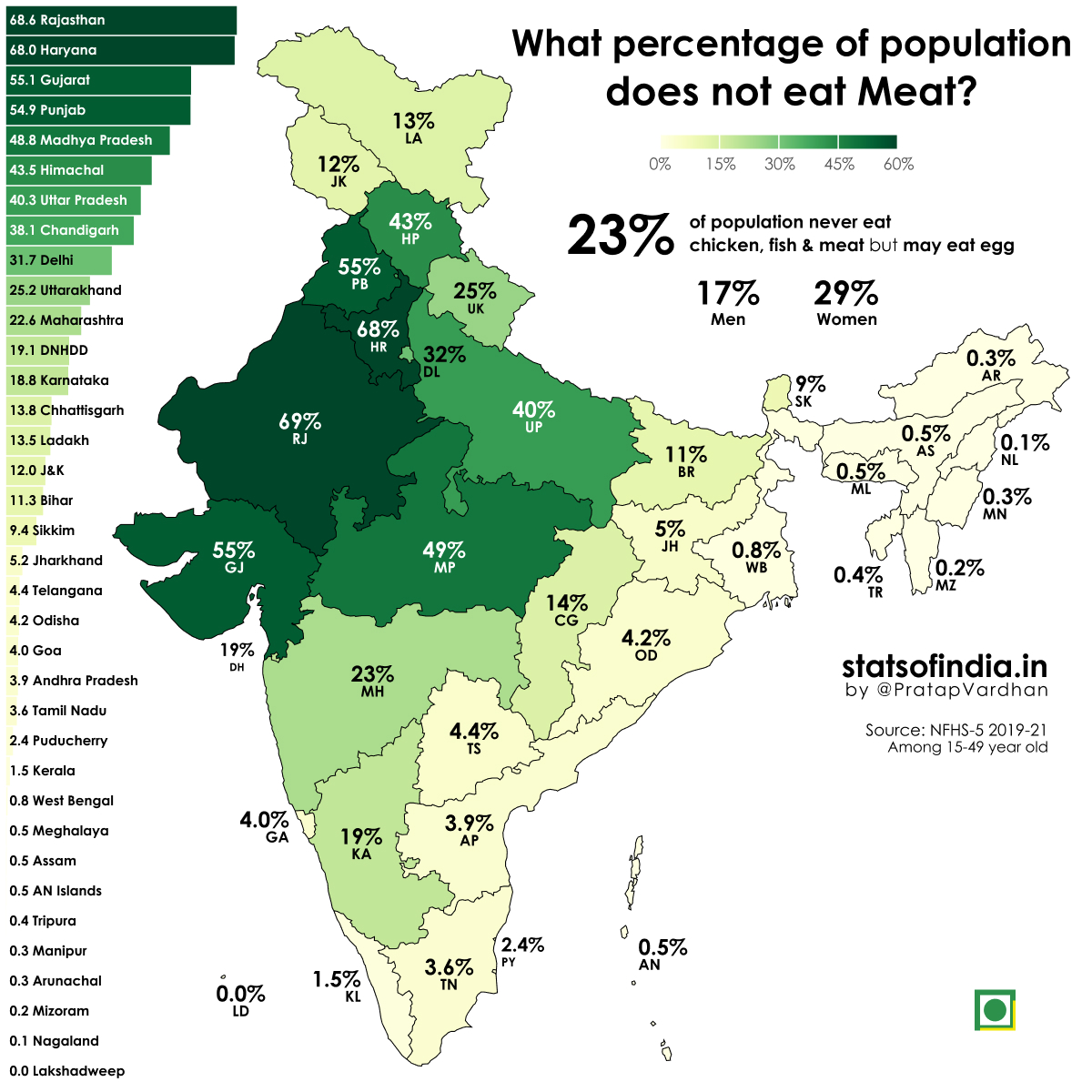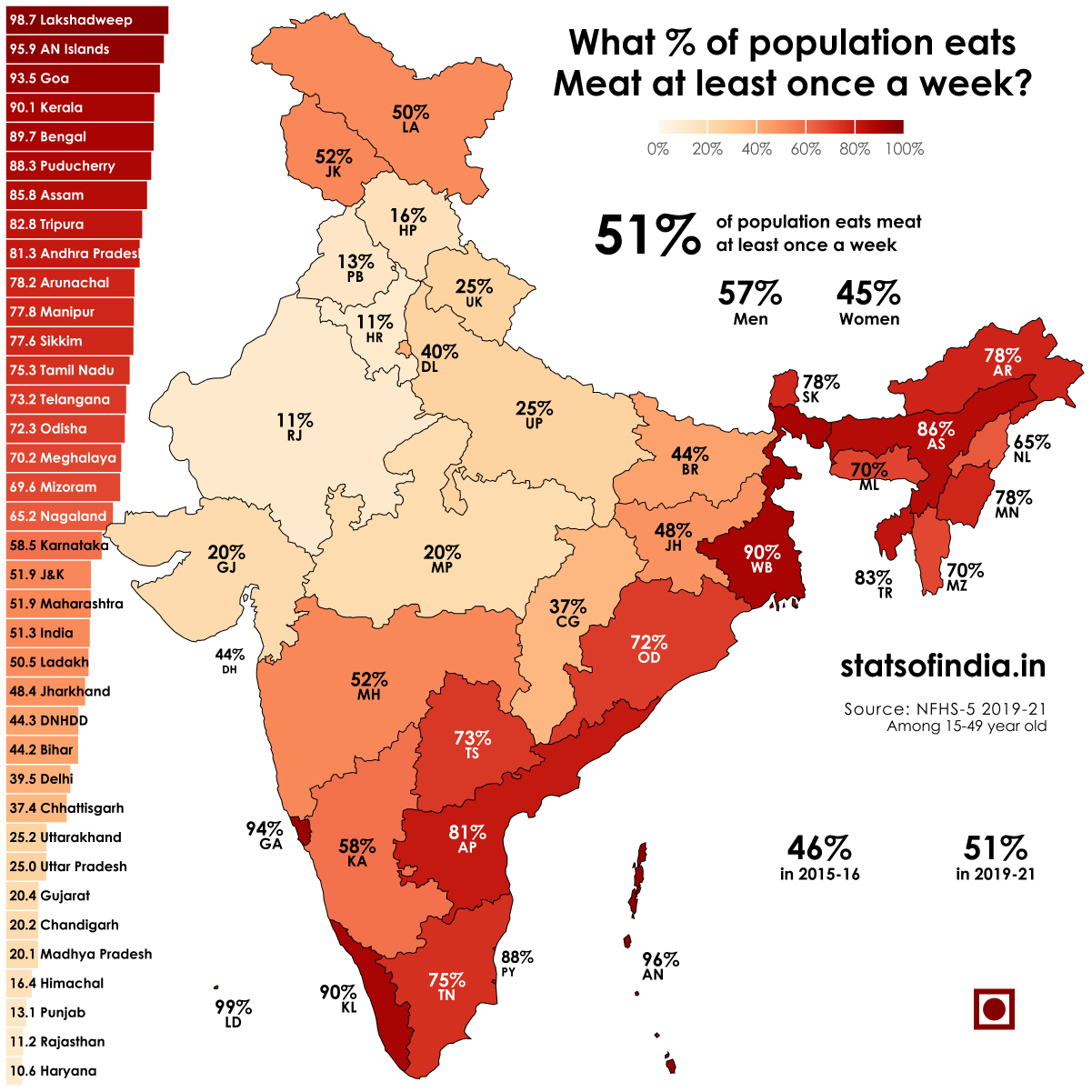Vegetarianism in India
The dietary practices of the diverse population in India are deeply intertwined with the country’s rich tapestry of religions. From Hinduism, which often extols the virtues of vegetarianism and holds cows as sacred, to Islam, which strictly prohibits pork consumption, religious teachings significantly shape dietary choices. Despite a majority of Indian adults incorporating some form of meat restriction into their diets, only a fraction identify as outright vegetarians, as revealed by a recent survey.
Pew Research Center Survey Findings
- All of India’s most widely practiced religions have dietary laws and traditions.
- Hindu texts often praise vegetarianism, and Hindus may also avoid eating beef because cows are traditionally viewed as sacred.
- Muslim teachings prohibit pork.
- The vast majority of Indian adults (81%) follow some restrictions on meat in their diet.
- This includes refraining from eating certain meats, not eating meat on certain days, or both.
- However, only 39% of Indian adults describe themselves as “vegetarian.”
- Among India’s six largest religious groups, rates of vegetarianism vary.
- For example, the vast majority of Jains say they are vegetarian (92%), compared with just 8% of Muslims and 10% of Christians.
- Hindus fall in between, with 44% describing themselves as vegetarian.
- Even among groups with low rates of vegetarianism, many Indians restrict their meat consumption.
- For example, roughly two-thirds of Muslims (67%) and Christians (66%) avoid meat in some way.
- Among Hindus, in addition to the 44% who are vegetarian, another 39% follow some other restriction on meat consumption.
- Many Jains avoid not only meat but also root vegetables to avoid destroying the entire plant.
- About two-thirds of Jains (67%) say they abstain from eating root vegetables such as garlic and onions.
- Even among Hindus and Sikhs, roughly one-in-five say they do not eat root vegetables (21% and 18%, respectively).
- Fasting is another common dietary practice in India.
- About three-quarters of Indians overall (77%) fast, including about eight-in-ten or more among Muslims (85%), Jains (84%), and Hindus (79%).
- Smaller majorities of Christians and Buddhists fast (64% and 61%, respectively), while Sikhs are the least likely to fast (28%).
- Religious groups in India fast to mark different occasions.
- Muslims fast during the month of Ramadan each year, while other Indians fast on certain days of the week and to mark important life events.
- Hindus, especially in the South, may fast before every Skanda Sashti – a day devoted to Skanda, the god of war.
- The survey asked whether respondents would ever eat food in the home of someone – or at a function hosted by people – whose religion has different rules about food than their own.
- Overall, Indians are evenly split on these questions, but there are wide variations by group.
- For example, roughly a quarter of Jains say they would eat in a home (24%) or at a function (27%) where the host’s religious rules about food differ from their own.
- Not only do religious dietary traditions impact Indians’ day-to-day lives, but they also influence concepts of religious identity and belonging.
- Indian adults are generally more likely to say that following dietary restrictions is a requirement for religious identity than to say that belief in God and prayer are essential.
- For instance, 72% of Hindus say someone cannot be Hindu if they eat beef.
- Fewer express the same sentiment about someone who does not believe in God (49%) or never prays (48%).
- Among Muslims, Sikhs, and Jains, even greater shares say that following dietary rules is essential to religious identity.
- For example, 77% of Muslims say a person cannot be Muslim if they eat pork.
- More than eight-in-ten Sikhs (82%) and Jains (85%) say that a person cannot be truly a member of their religion if they consume beef.
- Buddhists are split on the issue, with about half expressing that someone cannot be a Buddhist if they eat beef.
Vegetarianism in India May Be Over-reported
- According to three large-scale government surveys, 23%-37% of Indians are estimated to be vegetarian.
- Research by US-based anthropologist Balmurli Natrajan and India-based economist Suraj Jacob suggests that these estimates may be inflated due to “cultural and political pressures.”
- People tend to under-report eating meat, especially beef, and over-report eating vegetarian food.
- Taking cultural and political pressures into account, the researchers argue that only about 20% of Indians are actually vegetarian, challenging common claims and stereotypes.
- Hindus, constituting 80% of the Indian population, are found to be major meat-eaters, with even only a third of the privileged upper-caste Indians being vegetarian.
- Government data indicates that vegetarian households have higher income and consumption levels, indicating greater affluence compared to meat-eating households. In contrast, lower castes, Dalits, and tribespeople are mainly meat eaters.
- Dr. Natrajan and Dr. Jacob find that the consumption of beef is much higher than suggested by claims and stereotypes.
- Government surveys indicate that at least 7% of Indians eat beef.
- However, official data may be “considerably” under-reported due to cultural, political, and group identity struggles in India.
- The promotion of vegetarianism by Narendra Modi’s ruling Hindu nationalist BJP, which considers cows holy, has led to more than a dozen states banning the slaughter of cattle.
- Vigilante cow protection groups, operating with impunity, have targeted people transporting cattle.
- Despite official narratives, millions of Indians, including Dalits, Muslims, and Christians, consume beef. For instance, 70 communities in Kerala prefer beef over the more expensive goat meat.
- Dr. Natrajan and Dr. Jacob conclude that, in reality, closer to 15% of Indians, or about 180 million people, eat beef. This challenges official estimates by a significant 96%.


Bottom line
In synthesizing the insights gleaned from both the Pew Research Center Survey on dietary habits in India and the research conducted by Dr. Natrajan and Dr. Jacob, a nuanced portrait of India’s culinary landscape emerges, challenging prevailing stereotypes.
- The Pew Research Center’s survey unravels the intricate relationship between religion and diet in India, showcasing varying degrees of vegetarianism and meat restrictions across different religious groups. It underscores the impact of religious teachings on daily dietary choices and the multifaceted nature of fasting practices.
- On the other hand, Dr. Natrajan and Dr. Jacob’s research digs into the cultural and political pressures shaping reported dietary preferences. Their findings suggest that official estimates of vegetarianism may be inflated due to under-reporting of meat consumption, particularly beef, and over-reporting of vegetarianism, influenced by cultural and political dynamics.
- A common thread between both sets of findings is the complexity and diversity within India’s dietary practices. While the Pew Research Center highlights the prevalence of meat restrictions and fasting across various religious communities, Dr. Natrajan and Dr. Jacob shed light on the under-reported consumption of beef and the impact of political narratives on dietary behaviors.
- Collectively, these insights challenge common assumptions. For instance, the Pew Research Center dispels the notion that the majority of Hindus are vegetarian, revealing a substantial number of meat-eaters among them. Similarly, Dr. Natrajan and Dr. Jacob’s research challenges official estimates of beef consumption, highlighting a much higher reality, especially among marginalized communities.
- The convergence of these findings suggests that the narrative around Indian dietary practices is nuanced, shaped by religious, cultural, and political forces. It underscores the need for a more comprehensive understanding that moves beyond broad categorizations, acknowledging the fluidity and complexity inherent in individuals’ dietary choices.
- As India continues to evolve, these studies prompt a reevaluation of commonly held stereotypes and emphasize the importance of recognizing the diversity and dynamism within the country’s culinary traditions. In doing so, they contribute to a more accurate and nuanced portrayal of India’s rich and varied dietary landscape.

